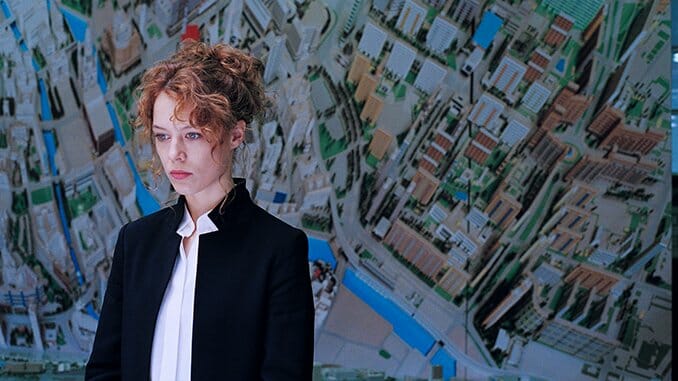Myth and History Commingle in Christian Petzold’s Ravishing, Romantic Undine
Images via IFC Films and Christian Schulz
Undine opens as a rom-com might. A lilting piano score, not without a shade of sadness, purrs quietly during the title cards. A tearful break-up presages a quirky meet-cute between industrial diver Christoph (Franz Rogowski) and city historian Undine (Paula Beer), our new couple bound by the irrevocable forces of chance—and, in director Christian Petzold’s own mannered way, a bit of physical comedy—as the universe clearly arranges for the pieces of their lives to come together. Squint and you could maybe mistake these opening moments for a Lifetime movie—that is, until the break-up ends with Undine warning her soon-to-be-ex (Jacob Matschenz) that she’s going to have to kill him. He doesn’t take Undine seriously, but the audience can’t be so sure. Beer’s face contains subtle multitudes. She could actually murder this guy. What once felt familiar now feels pregnant with dread. And that’s saying nothing about Christoph’s odds for survival.
Petzold won’t strike many as the kind to indulge whimsy in any form, but as a foundational member of the Berlin School, his films have rarely denied genre. Instead, they are reactions to what he’s called “pigeonholing” in an interview in Cineaste from 2008, avoiding “divvying up cinema” by reimagining genre as something more impressionistic, more academically elusive, maybe even more emotionally resonant than what he found in the New German Cinema movement of the ’70s. His film from 2007, Yella, pulls from Herk Harvey’s Carnival of Souls and gothic horror to explore German identity following reunification. His devastating Phoenix, from 2014, treads in melodrama and noir-steeped thrills to continue purging the trauma of Germany’s past. (In that 2008 interview, Petzold also adds, “Hitchcock said that you couldn’t film a great novel, only a bad one. I find myself agreeing with this, for cinema is not literature.” Almost a decade later, he’d adapt Anna Seghers’s 1944 Transit, transposing the setting to modern Marseilles but keeping its characters, and its post-WWII plot, firmly in the 40s, stranding it in a liminal, metaphorical stasis. It almost reads like sci-fi.) In other words, if you sense Undine’s beginnings in popcorn fare, you aren’t alone. Petzold is still figuring out what this all means for him too.
Petzold isn’t blindly mining the past, either. Based on an early 17th century German novella, itself based on an older French folktale, Undine offers little context for the fantasy underlying its standard plot. Which is much of the point, probably: This story is in the bones of modern German culture. After Undine threatens the life of the boyfriend trying to break up with her—which is funnier to read than to watch—she crosses the street to give a lecture on Berlin architecture at the Märkisches Museum, where she works. Threaded throughout Undine are these beautifully utilitarian speeches, in which Beer’s mellifluously unaffected voice, always on the cusp of either boredom or epiphany, describes how various city planners have approached the ever-changing character of the metropolis. As the film goes, so do the lectures back in time: First we learn about the joining of socialist and capitalist aesthetics following 1990’s reunification, then we learn of the Soviet influence on East Germany after WWII—the “dreams” of socialism manifest—then we move further back, to the origins of the royal palace in the 1800s, and so on, into the realm of lore.
As Undine speaks, Petzold and his regular DP Hans Fromm pivot around a huge model of the city, color-coded and in pieces, reflecting how varied and confusingly Berlin’s history has rooted. In that initial scene, Petzold even zooms in on the model to reveal Undine thinking about her ex-lover in that spot in the real world, the location rendered in tiny detail but overlaid with her exquisite memory of that place in that time. Petzold tessellates eras, gives them shape with myth. History lives in the walls of every structure in Berlin, watching, and Undine seems tuned into its eternal, god-like channel. As in Transit, the ghostly past coexists with a haunted present. Fromm treats time as a texture.
Anyone remotely familiar with the “Undine” tale knows that she’s not lying to her ex. Undine is a water spirit, making covenants with men on land in order to access a human soul (as well as a tasteful professional wardrobe). Breaking that covenant is fatal. Or so the story goes. When she meets Christoph, she’s revitalized, because she’s heartbroken but especially because he takes such interest in the subjects of her lectures. He too is bound to the evolving bones of Germany, repairing bridges and various underwater infrastructure—he may, in fact, be more intuitively connected to the country than most. He’s the rare person who’s gone beneath it, excavating and reconstructing its depths, entombed in the mech-like coffin of a diving suit he wears when welding below the surface.
-

-

-

-

-

-

-

-

-

-

-

-

-

-

-

-

-

-

-

-

-

-

-

-

-

-

-

-

-

-

-

-

-

-

-

-

-

-

-

-








































